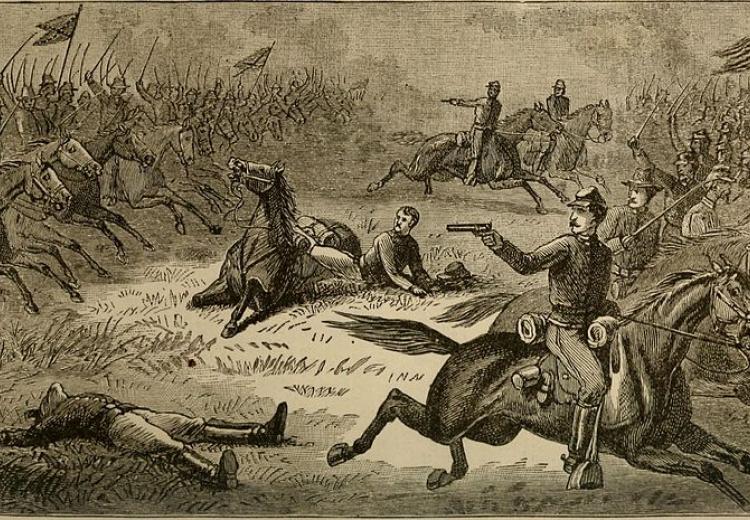War Literature: Being There or Not

Word and Pen or, Ventures and Adventures of Willard Glazier in War and Literature (1890)
Literature about war—whether the lived experience of the author or not—has over the centuries taken the form of many genres: epic, tragedy, comedy, narrative poetry, history play, novel, short story, memoir, and lyric poetry. While reading works from Homer’s Iliad to Tim O’Brien’s The Things They Carried, students can benefit from identifying not only the wide variety of genres depicting battle and its consequences but also from recognizing the stark contrasts these genres can represent in tone, style, point of view, and intent. Students may also find it of value to consider the war experience, if any, of the authors in question.
Homer—about whose life we know little—put down in writing in the late eighth or early seventh century B.C.E. parts of the Hellenic epic cycle—Iliad and Odyssey—that bards had transmitted orally for centuries. The demands of the oral tradition dictated much of the epic’s style, for example, frequent use of simile and metaphor and long, stylized speeches between adversaries. Euripides, the fifth century B.C.E. poet of Greek tragedy, who, as far as we know, never experienced war himself, based Trojan Women and other plays on myth and epic. Both Iliad and Trojan Women abound in war imagery.
In his tragedy The Persians, Aeschylus—a veteran of the Battle of Marathon—wrote, in a reversal of his own experience, from the perspective of the defeated invaders of Greece.
Sophocles, who served in Athenian military campaigns, wrote in Philoctetes of the tragic and ironic plight of the soldier whose festering wound (acquired on the way to Troy) kept him out of the Trojan War.
Aristophanes, for whom we have scant biographical details, wrote his comedy Lysistrata, from the point of view of women who hold men to account for their continuance of war. Old Comedy, especially in the hands of Aristophanes, took elements of tragedy and applied them to comedy, even creating a character named Euripides, an Athenian poet of tragic drama, in Lysistrata who dressed as a woman in order to slip in among the women and listen in on their plans to undermine the war effort. (Old Comedy, pardon the pun, took no prisoners.)
Not at all a soldier, Virgil, the first century B.C.E. Roman poet—who took a different angle on the Trojan War from Homer and Euripides—wrote his epic, Aeneid, from the point of view of the Trojan prince Aeneas, who flees the burning walls of Troy with other soldiers, his father, and his son to found a new city in Italy.
Shakespeare never stepped on the field of battle but wrote stirring speeches in Henry V for the young king who led English troops in victory against the French at Agincourt. The Bard wrote the play, it is believed, in 1599, nearly two hundred years after the events depicted in Henry V.
Late in the Crimean War (1854), Alfred Lord Tennyson penned the highly patriotic “Charge of the Light Brigade,” which glorifies the many who perished—“Into the Valley of Death / Rode the six hundred”—because “someone had blundered.” Tennyson, a nearly life-long litterateur, had read about the ill-fated charge in the Times. In 1891 Rudyard Kipling wrote “The Last of the Light Brigade” to draw the British public’s attention to the financial straits of many of the old veterans of the Crimean War.
Ernest Hemingway was an ambulance driver in Italy during World War I and based short stories and novels, certainly, on scenes he witnessed, and soldier–poet Wilfred Owen penned moving verse on the impact of the Great War before dying in action, a week before the signing of the Armistice. Both Hemingway and Owen depicted war’s harsh realities.
More recently, Joseph Heller and Tim O’Brien, who served in WW II and the Vietnam War, respectively, wrote novels on the wars in which they served. In Catch-22, Heller creates the unforgettable character Yossarian, who becomes mired endlessly in the absurdity of an administrative catch, while in The Things They Carried, O’Brien’s cast of characters provides a likely and realistic cross section of soldiers serving in Vietnam.
The talent needed to write about war does not necessarily derive from the fact of having experienced war, and yet some talented writers, including memoirist Philip Caputo, a U.S. Marine who penned A Rumor of War, and journalist A. J. Liebling, whose war writings of what he observed firsthand in France appeared in the New Yorker, do hone their skills on the conflict they witness firsthand. Aside from genre identification and textual analysis, students may first find that their awareness of a writer’s sources, whether based on oral tradition, personal experience, historical texts, or journalistic reports provides for a richer reading than would be the case otherwise.
Links:
